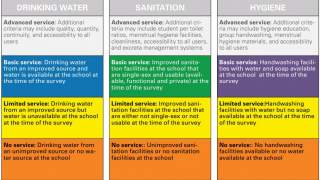In 2016, the JMP developed methods for global monitoring of WASH in schools to establish baseline estimates for the relevant Sustainable Development Goal (SDG) targets (4.a, 6.1, and 6.2) and to track progress over time.
The JMP uses service ladders to benchmark and compare progress across countries on WASH in schools (Figure 1). These service ladders are designed to track progress towards a “basic” level of service, which is the indicator used for global monitoring of SDG targets related to WASH in schools. Where “basic” service is already the norm, a country-defined “advanced” service level may also be appropriate based on the national context, priorities and resources.

Supporting national monitoring of WASH in schools
To support the collection of comparable data between and within countries the JMP, through expert consultation, prepared core and expanded questions for WASH in schools.
An Excel file has been created with the list of core questions (tab: Core) and associated tabulation (tabs: W1-2, S1-3, H1-2) required to produce comparable national estimates for the proportion of schools with “basic” WASH services. These can be integrated into school censuses (e.g. EMIS), school surveys and other data collection tools. The file is based on the 2018 JMP publication and allows for copying and pasting of the available material in an easier way.
In addition, an expanded list of questions (tab: Expanded) and associated tabulation (tabs: XW1-2 to XHB1-5) are provided to support advanced assessments of WASH in schools. Menstrual hygiene-related questions and tabs are highlighted in teal so this emerging core topic can be easily identified.
KoBo Toolbox users can use the last three tabs in the file (survey, choices, settings) to upload the core and expanded questions to KoBo after modifying as appropriate.
The methods used by the JMP to compile and harmonize available data on schools is explained in a separate publication. The latest report on WASH in schools uses available harmonized data to estimate national, regional and global coverage.
The JMP team welcomes feedback on the existing core questions and as well as suggestions for expanded sets of questions for SDG monitoring of WASH in schools. Please contact us with your feedback at info@washdata.org.